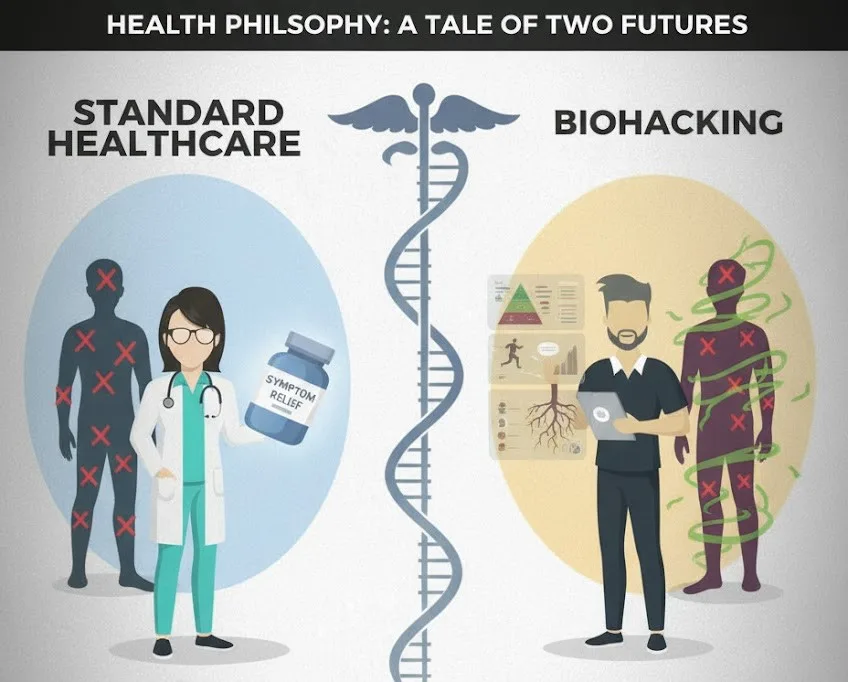The landscape of health and wellness is vast, with numerous philosophies and practices vying for attention. While traditional medicine has long been the cornerstone of our healthcare system, a newer, more proactive movement known as biohacking is gaining traction. An insightful image circulating online perfectly encapsulates the core differences between these two paradigms, prompting us to consider: are we treating symptoms or seeking root causes?
The Standard Healthcare Perspective: Managing Symptoms for Life
The image portrays standard healthcare as a system primarily focused on alleviating symptoms. The doctor's message, "I will treat you with medication to weaken the symptoms, just continue what you are doing, no need to adjust your lifestyle, food or bad habits," highlights a reactive approach. In this model, the emphasis is often on pharmacological interventions to suppress discomfort or dysfunction, with less direct attention paid to the underlying factors contributing to the ailment. The stark follow-up, "You'll probably be on these meds for life," underscores a common reality in chronic disease management, where medications become a long-term fixture rather than a temporary solution.
This approach, while often effective in providing immediate relief and managing acute conditions, can sometimes overlook the power of lifestyle in preventing and even reversing illness. It can create a dependency on external remedies, potentially leaving individuals feeling disempowered in their own health journey.
The Biohacking Approach: Uncovering and Eliminating the Cause
In stark contrast, the biohacking side of the image advocates for a deeply investigative and proactive stance. The biohacker asks, "Tell me about your lifestyle. How is your sleep, nutrition, exercise and daily routines?" This immediately shifts the focus from external fixes to internal environments. Biohacking is about self-experimentation and leveraging science, technology, and lifestyle changes to optimize one's body and mind. The goal is not just to feel better, but to understand the intricate mechanisms of one's own biology and to "hack" them for improved performance, longevity, and well-being.
The promise here is significant: "We'll find the problem and a solution to eliminate the cause forever." This speaks to a desire for true resolution rather than perpetual management. Biohackers often delve into areas like sleep optimization, personalized nutrition (often guided by genetic or microbiome testing), targeted supplementation, exercise regimens tailored to individual needs, stress management techniques, and even advanced technologies to monitor and influence biological processes.
The Core Question: Root Cause vs. Superficial Symptoms
The powerful question posed at the bottom of the image, translated from Persian, succinctly captures the essence of this debate: "Should we pursue eliminating the root cause of a problem, or just pursuing the elimination of the superficial symptoms of a problem or disease?"
This question is not merely rhetorical. It challenges us to critically evaluate our own approach to health. Are we content with merely masking discomfort, or are we willing to embark on a journey of self-discovery and lifestyle modification to address the fundamental reasons behind our health challenges?
Finding a Balance
It's important to note that this isn't necessarily an "either/or" scenario. There are times when standard medical interventions are absolutely crucial and life-saving. Biohacking, on the other hand, can complement traditional medicine by empowering individuals to take a more active role in their health and well-being, potentially reducing the reliance on long-term medications or preventing issues from arising in the first place.
Ultimately, the image serves as a powerful reminder that true health often lies in understanding ourselves better and making informed choices that address the foundations of our well-being, rather than simply patching over the surface. The path we choose depends on our philosophy: are we seeking lifelong management, or are we committed to uncovering and eliminating the root causes for lasting health?

